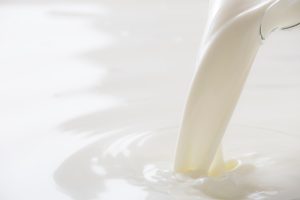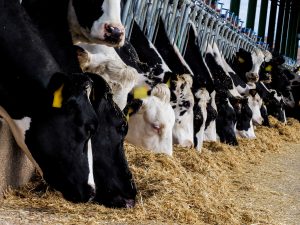Ishaya U. Gadzama & Fernando Diaz
Cottonseed cake is the co-product of oil extraction from cottonseeds. Cottonseed meal is the term applied to the ground cottonseed cake from which most of the oil has been extracted. Cottonseed cake is used as a protein supplement and can replace soybean meal and other protein sources in the ration. It is a good source of protein, energy, fiber, phosphorus and vitamin E for dairy cows. However, the nutritional value of cottonseed cake depends on the method of oil extraction, proportion of husk and lint and degree of decortication.
Cottonseed cake has relatively low rumen degradability and is therefore a good source of bypass protein for dairy cows. Despite its high nutritional value, cottonseed cake contains gossypol, a phenolic compound which can produce intoxication, liver damage and reproductive problems in animals. Interestingly, ruminants can detoxify free gossypol by converting it into bound gossypol in the rumen, thereby impeding its absorption into the blood. Therefore, cottonseed cake has shown promise as a plant protein substitute in dairy cow diets.
Recently, Webb et al. (2019) evaluated the effects of replacing soybean meal with cottonseed cake on dairy cow performance. The study was conducted on 48 mid-lactation Holstein cows of 190.7 ± 64.3 days in milk at the Department of Animal and Dairy Science, University of Georgia, Tifton. The cottonseed cake used for this experiment was a product of dry extrusion of whole cottonseeds at 121 to 149 °C for 12 to 20 seconds.
Three experimental diets were formulated each containing 45.03% corn silage, 4.33% Bermuda grass hay, 10.8% ground corn, 9.5% citrus pulp, plus 0.43% urea on a dry matter (DM) basis. Diet one (control) contained 5.20% of solvent-extracted soybean meal, 4.50% expeller soybean meal, and 0% cottonseed cake. Diet two contained 0% inclusion levels of solvent-extracted soybean meal, 4.50% expeller soybean meal, and 8.66% cottonseed cake. Diet three contained 6.23% inclusion levels of solvent-extracted soybean meal, 0% expeller soybean meal and 8.66% cottonseed cake.
The table below shows the chemical composition of cottonseed cake, soybean meal and expeller soybean meal used in the experiment. From the results, cottonseed cake had lower crude protein concentration (CP; 32.3% of DM) than solvent-extracted soybean meal (50.8% of DM) or expeller soybean meal (48.7% of DM). However, the concentrations of soluble crude protein, neutral detergent fiber, acid detergent fiber and ether extract were higher in cottonseed cake than in solvent-extracted soybean meal or expeller soybean meal.
|
Nutrients |
Cottonseed Cake | Soybean Meal* | Expeller Soybean Meal |
| Dry Matter (DM, %) | 93.6 | 90.4 | 89.5 |
| Crude Protein (% of DM) | 32.3 | 50.8 | 48.7 |
| Soluble Crude Protein (% of CP) | 16.7 | 12.9 | 8.13 |
| Neutral Detergent Fiber (% of DM) | 43.8 | 8.03 | 17.7 |
| Acid Detergent Fiber (% of DM) | 34.0 | 4.88 | 7.65 |
| Ether Extract (% of DM) | 5.53 | 1.85 | 1.32 |
| Intestinally Digestible Protein (% of CP) | 30.2 | 24.8 | 65.9 |
| Rumen Undegradable Protein (% of CP) | 54.6 | 34.0 | 78.0 |
| Rumen Degradable Protein (% of CP) | 45.3 | 66.0 | 22.0 |
| Total-Tract Digestible Protein (% of CP) | 75.5 | 90.9 | 87.9 |
| *Solvent-extracted soybean meal | |||
Similarly, the concentration of intestinal digestible protein in cottonseed cake was slightly higher (30.20% of CP) than in solvent-extracted soybean meal (25.85%) but lower than that obtained in expeller soybean meal (65.90%).
The researchers also observed that the concentration of rumen undegradable protein in cottonseed cake was higher (54.65% of CP) than that (33.98%) in solvent-extracted soybean but lower (77.98%) than the one recorded in expeller soybean meal. On the other hand, the concentration of rumen degradable protein in cottonseed cake was lower than the values reported for solvent-extracted soybean meal or expeller soybean meal. Furthermore, total-tract digestible protein for cottonseed cake was lower than solvent-extracted soybean meal and expeller soybean meal.
The replacement of solvent-extracted soybean meal or expeller soybean meal with dry-extruded cottonseed cake did not affect dry matter intake (27.8 kg/d), milk production (33.1 kg/d), as well as milk protein (0.96 kg/d) and fat (1.32 kg/d) yields.
Milk protein percentage was higher (2.96%) in cows fed solvent-extracted soybean meal plus expeller soybean meal. The lowest percentage of milk protein (2.84%) was observed in cows that received expeller soybean meal plus cottonseed cake. Milk urea nitrogen was similar (8.92 mg/dL) in cows fed diets 1 and 3, which was higher than the 7.58 mg/dL reported in cows on diet 2. There were no treatment differences in body weight changes and body condition score. Similarly, the efficiency of production was not affected by the different treatments.
This study shows that cottonseed cake could replace solvent-extracted soybean meal as a source of protein in lactating dairy cow diets.
Reference
Webb, N.W., Bernard, J.K. and Tao, S. 2019. Production Responses to Diets Supplemented with Soybean Meal, Expeller Soybean Meal, or Dry-extruded Cottonseed Cake by Lactating Dairy Cows. Applied Animal Science. 35:543 – 549.
© 2020 Dairy Knowledge Center. All Rights Reserved.











